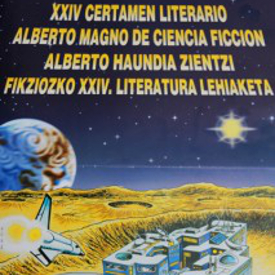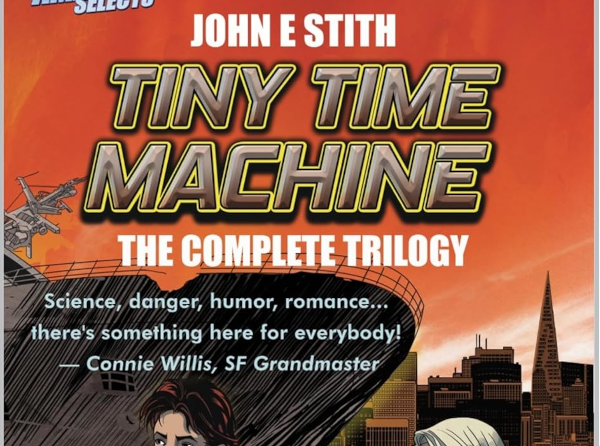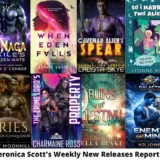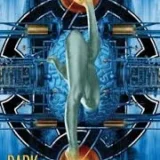Paul Cook’s article “When Science Fiction Is Not Science Fiction” and the prolific commentary it generated (September 4, 2013, Amazing Stories), got me thinking again about our evolving perceptions of what science fiction is, what it isn’t, what its role in literature is, and how it is generally perceived by both SF and non-SF readers. This article couldn’t have come at a better time either: This fall and winter I’ll be teaching my first semester at George Brown College and University of Toronto on how to write science fiction. And it’s aptly on the heels of a new award Amazing Stories has just created: the Excellence in SF Denialism Award (see September 8, 2013 post in Amazing Stories).
Cook proclaimed that he’s “too old to put up with indulgences by books claiming to be one thing, but are really something else.” He gave examples of various authors who, in his opinion, were really writing another genre (usually romance) and were calling it science fiction. He called Gene Wolfe’s series The Book of the New Sun a Medieval/Arthurian fantasy—not science fiction. He described Lois McMaster Bujold as a closet romance writer and called her military SF Miles Vorkosigan series romance at its core—not science fiction. Is this a fair assessment? When does science fiction with romance turn into romance with SF elements?
Let’s start off with what science fiction isn’t.
 Science Fiction Is Not Escapist Literature
Science Fiction Is Not Escapist Literature
Cook suggested that SF is an “escapist genre”. Good science fiction is, in fact, quite the opposite. I stress “good” science fiction. Of a surety, all genres contain escapist works. But for the sake of this argument, I speak of that which best represents the genre.
It is a profound mistake to interpret the genre of science fiction literally. Science Fiction is both “the great modern literature of metaphor and pre-eminently the modern literature not of physics but of metaphysics,” says Australian scholar and critic Peter Nicholls. Science fiction has been referred to as the literature of “idea”, of “the large”, and of “change & transformation”. How does science fiction achieve this great scope? It does so through metaphor.
Science Fiction is the Literature of Allegory & Metaphor
In an article in the June 2005 The Guardian entitled “Why We Need Science Fiction”, Margaret Atwood submits that science fiction explores the relationship of humanity to the universe. It is “an exploration that often takes us in the direction of religion and can meld easily with mythology,” says Atwood and cites the obvious religious allegories of Star Wars and The Matrix. Author Brian Ott reminds us that it is not what the aliens are but what they represent that matters. Good science fiction is allegory.
Literature in general has always served as a cultural reporter on themes important to humanity. The science fiction genre—and speculative fiction particularly—explores premise based on current scientific and technological paradigms. What if we kept doing this?…What if that went on unchecked?… What if we decided to end this?… These are conveyed through the various predictive visions from cautionary tales (e.g., Atwood’s “Oryx and Crake”) to dystopias (e.g., Huxley’s “Brave New World”).Where realist fiction makes commentary on our current society, science fiction takes that commentary into the realm of consequence by showing it to us in living colour. This is its power over contemporary fiction and why, I think, mainstream literary authors like Margaret Atwood have discovered and embraced this genre (her latest three books are all science fiction). Science fiction doesn’t just “tell us”; it can “show us”.
In science fiction, science provides the premise and fiction explores the answer.
Themes like achieving forgiveness, love & compassion, overcoming fear, taking control of one’s fate & fulfilling one’s destiny, etc. are often played out through the encounter of—and often clash with—“the other.” The “other” may be aliens, peoples of a different culture, some new technology, a fantastical unknown entity, or a place with strange powers. In the end, the POV characters must overcome their own darkness, reflected in “the other” to ultimately prevail.
In Neill Blomkamp’s “District 9” set aptly in an alternate present-day Johannesburg, in which visiting aliens have been incarcerated within filthy ghettos, the heroic journey of the ordinary human WIkus van de Merwe reflects the global journey of humanity in reaction to the “other”. Blomkamp’s metaphors to our jaded history of prejudice and racism are clever and vary from the subtle to the obvious. While many viewers saw no further than the thrilling elements of the movie—alien visitation; kick-ass weapons and cool creatures getting blown up—District 9 conveyed a powerful allegory that asks unsettling questions about colonial powers. Critic Frederic Jameson reiterates, “Science Fiction is in its very nature a symbolic meditation on history itself.”
Science Fiction is Subversive Literature
Oscar Wilde once said: “Art is individualism, and individualism is a disturbing and disintegrating force. There lies its immense value. For what it seeks is to disturb monotony of type, slavery of custom, tyranny of habit, and the reduction of man to the level of a machine.” Susan Sontag said, “Real art makes us nervous.” For me, that is what science fiction does: it examines our world and presents us with new perspectives to ponder, and evolve from. Without darkness to contrast it, light cannot be recognized for its virtues, nor can it even be properly seen; darkness is the platform from which light emerges in all its glory. I’m not just talking about good and evil. Metaphorically, darkness represents anything within us that is repressed, that we’re ashamed of or uncomfortable with. It is the unknown—and the stuff of science fiction.
Science fiction illuminates our history and our very humanity. It does this by examining our interaction with “the other”, the unfamiliar. A new relationship. A stranger in town. A scientific discovery. A clash of cultures. An alien encounter. How do we react? Is it with fear? Wonder? Curiosity?
Good SF accurately takes the premise of real science and explores it to the realm of possibility and consequence. This genre, more than any other, gives us the opportunity to look at what may be, how we get there and what happens to us as a result. Think of the writings of Greg Bear, Robert J. Sawyer, Robert Wilson, Kay Kenyon, William Gibson, Robert Silverberg, Isaac Asimov, Stanislav Lem, and Ray Bradbury (to name some of my own favorites). The SF writer is both herald and conscience of science and humanity. We are commentators of the present and reporters of the future. Science fiction is subversive literature.
 Science Fiction is the Literature of Change & Transformation
Science Fiction is the Literature of Change & Transformation
Science fiction is a genre of global examination and evolution. It explores humanity’s own identity, our values and our evolution by showing how we react to change and the unknown. Science fiction postulates and extrapolates. It takes a plausible premise (idea) and runs with it. In most science fiction something significant happens, is discovered or is revealed that is science-based and has profound effects on the world—See John Wyndham’s The Chrysalids, Isaac Asimov’s I, Robot, Ray Bradbury’s Martian’s Chronicles, Robert J. Sawyer’s Calculating God, Nina Munteanu’s Darwin’s Paradox (apologies–I just had to throw that one in!). The events, actions or discoveries throw the main protagonist and his/her world off balance into a full-tilt journey of self-discovery (the classic hero’s journey). Science fiction is the transformative literature of change.
Science Fiction is the Literature of Relationship
All great literature distills its art form through the exploration of relationship: our relationship with technology, with science, nature, God, our children, each other, our history, our destiny, etc. etc. etc. Story happens when character intersects with issue (plot and theme). Without characters and without a world for them to interact with in ways that illuminate some thematic issue, there would be no story and no one to empathize with.
What better art form than the “love story” to discover our humanity. It is through love—in all its facets—that we find passion, courage, direction and meaning in life. And there are as many different forms of love as there are love stories: romantic love, platonic love, altruistic love, heroic love, maternal love, filial love, charitable love, divine love, unconditional love, and so on.
The greatest love stories also tell of hardship overcome, lessons learned, and barriers surmounted. The Great Gatsby by F. Scott Fitzgerald is, in fact, a cautionary tale about the American Dream. It explores themes of decadence, idealism, and the social barriers between economic strata through the ill-fated love between the self-made and quixotic Jay Gatsby and the ultra-rich and spoiled Daisy Buchanan. Thomas Hardy’s Tess of the d’Urbervilles explored similar themes of class prejudice and privilege through the tragic love story of Tess and Angel Clare. I could list many stories that explore major social and cultural issues through love. Think of them: Gone with the Wind by Margaret Mitchel; Doctor Zhivago by Boris Pasternak; Vanity Fair by William Makepeace Thackeray; The English Patient by Michael Ondaatje; Wuthering Heights by Emily Bronte; The French Lieutenant’s Woman by John Fowles…just to name a few. Most of us wouldn’t think to call these love stories at first; yet, that’s what they are—told against a strong setting of historical and social commentary.
Strong elements of love, romance and relationship underlie many science fiction stories. And to revisit Lois McMaster Bujold, the Vorkosigan series interlaces relationship with a tapestry of political intrigue between cultures and explores class privilege, disabilities, and the evolution of cultural practices.
My trilogy The Splintered Universe follows detective Rhea Hawke on her ill-fated quest for justice in a religious massacre. A major part of the plot revolves around her turbulent relationship with a strange man—directly related to her racist attitude. While the relationship is a critical element in Rhea’s life journey, I would certainly not call the book a romance. Yet, without the romance, the story would fall apart. Without the science fiction elements (e.g., world-building, aliens, space travel, etc.), the story would also fall apart. Both are needed to make this trilogy what it is.
Science fiction as a genre is certainly evolving. It’s interesting to note that at no other time are there more women interested in the genre, either reading it or writing it. Women offer a different perspective on story, idea and vision of our world and our future. It is an important perspective and one that relates very importantly to consequence through relationship (the purview of science fiction). Perhaps, we are experiencing the emergence of a new era; and some of us are left struggling at the doorstep.










Very good post and good points
Thanks, Tanya!
Best Wishes,
Nina
Thank you so much for this post! This illustrates perfectly why I love SF.
Thanks, Diane!
Me too! 🙂
Best,
Nina
p.s. As post script to what I mentioned about relationship, perhaps the best way to differentiate science fiction literature through relationship from its other genre-cousins is to discern whether the principle relationship is tied to the premise (the “what if”). In science fiction, I think this is important. In romance in a science fiction setting, this is not necessary. In my trilogy about galactic detective Rhea Hawke (The Splintered Universe Trilogy), virtually all her relationships are linked to the main premise.
Best Wishes,
Nina
Thank you for sharing, Otto66 and B.Morris Allen.
Morris, there is no one way to best describe science fiction, I think, but you have certainly found a good way to call it the literature of “idea” (I think Robert J. Sawyer coined that one). “Idea”, however, is really just the premise (the “what if”) from which story springs through relationship and consequence (and on this Rob would also agree). Without relationship (to an idea, a person, thing, world, place or concept), there is no consequence (the end result of the “what if”). You cannot have one without the other. You say that without ideas it’s just an adventure story; I say that without relationship it isn’t even a story.
Thanks again for your thoughts!
Best,
Nina
Salut! I agree with much of what you say, but we part ways when you describe science fiction as the literature of relationship. That’s true of pretty much any literature. I think it’s much more accurate to say that SF is the literature of ideas – without relationships (reasonably defined) SF can exist. Without ideas, it’s just an adventure story (at best). Nothing against adventure, but it’s not quite the same.
However, I’ve never felt the need to be so dogmatic about science fiction (or fantasy, or speculative fiction, or fairy stories). Nor do I get very upset about it. I’m really unmoved by paranormal stories. But I have no great difficulty including them in SFF. Same with SF movies, most of which I would have difficulty holding up against SF books (the “I, Robot” travesty comes to mind).
If we have to define it, then I think SF is about “what if” – Heinlein’s “If This Goes On”. (https://www.bmorrisallen.com/commentary/sowhatssfforanyway). If you’re addressing that, you’re SF in my book, even if it’s just background for ray guns and alien lizards..
I was enjoying your post up until you put Stanislaw Lem between Asimov and Bradbury. I will be kind and state that I strongly disagree with placing a hack anywhere near authors of their caliber. Were I not limited to a cellphone keyboard I would expound on my opinion.